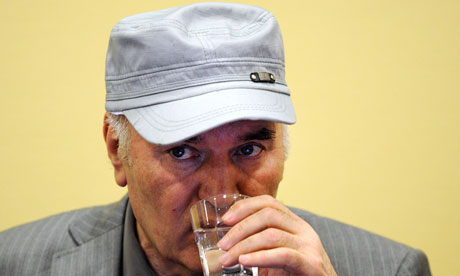Allegations that Serbian soldiers were murdered because they discovered where General Ratko Mladic was hiding from war crimes charges could soon go before the European court of human rights, after the constitutional court in Belgrade found the soldiers' parents had been denied justice.
Janko Jakovljevic said the Belgrade ruling confirmed his belief that his son, Dragan, and another guard at a military barracks in Belgrade, Drazen Milovanovic, had been killed in 2004 because they had inadvertently found out that Mladic was being sheltered by Serbian officers there.
The Bosnian Serb commander was captured in 2011 and is on trial before The Hague war crimes tribunal for genocide and crimes against humanity, for his part in atrocities during the 1992-95 Bosnian conflict.
"Our sons were killed because they either saw Mladic or his security teams," Jakovljevic told the Guardian. He said he and Milovanovic's parents received a letter in January from "someone in Mladic's security" giving details of the killing. They believe the letter is genuine and have handed it over to the prosecutor's office.
An initial Serbian army inquiry ruled that one soldier killed the other then himself, but an independent commission later found the two soldiers had been killed by a third person using a different weapon.
The constitutional court judgment last month said that the parents had been denied a fair trial and awarded them €5,000 (£4,000) in compensation. Jakovljevic said if there is no new investigation they will take their case to the European court in Strasbourg.
In 2005, a Serbian deserter, Sergeant Miroslav Petrovic, told the Belgrade daily Danas, that he went to a meeting on improving Mladic's security the previous year at Topcider, the same barracks where the two soldiers were killed. "I attended a meeting at Topcider where I met many members of the Bosnian Serb army, whose task was to secure the routes for the general if he travelled north of Serbia or to Bosnia," Petrovic said. Of the two murdered soldiers he said: "Mladic was in Topcider last October. The unfortunate fellows saw him and were executed instantly."
Petrovic's current whereabouts are unknown and he could not be contacted.
Mladic was protected by the Serbian regime under Slobodan Milosevic but after he was toppled in 2000 in democratic elections, shielding war crimes suspects from The Hague tribunal was made illegal.
The Topcider case is not the only one in which Serbian soldiers are alleged to have been killed because they knew too much about Mladic. Srdjan Ivanovic was found dead at the Sinkovce barracks near Leskovac in August 2005 in what the army said was a heroin overdose.
His father, Miodrag, insisted that his son never took drugs or drank alcohol. He added that his son had finished his year's military service and only took the bus to Leskovac on the day he died to return his gun and keys to the military vehicles he was responsible for as a military driver. "Before he went back he said he was afraid for his life because as well as being a driver for his commander, he had also been a driver for Mladic," he said.
Two other soldiers at the same barracks had been killed over the previous year and their deaths officially described as suicides despite plentiful evidence of murder. "I said I would go with him back to Leskovac but he said: 'Don't worry – it's just for a day,' and I never saw him again."
A legal analysis of the Leskovac killings commissioned by the Centre for Euro-Atlantic Studies in Belgrade, found that in Ivanovic's case, autopsy provided "no data on whether the soldier had consumed heroin or any other hard drugs , how the heroin got into the soldier's organism and whether there are any marks of intravenous injection of heroin on his body"
Ivanovic said that if he does not get justice for his son in Serbia, he will also take the case to Strasbourg.
"Most likely, these kids saw something and were killed for it and the military covered it up," Jelena Milic, the executive director at CEAS, said. "We can't begin to reform Serbia if we can't get at the heart of darkness in the military."











